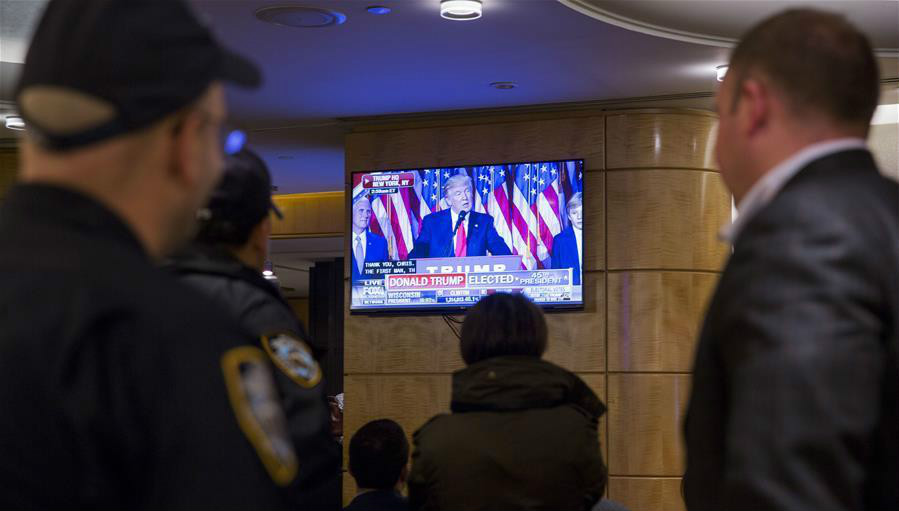Despite election, course of US-China ties remains unchanged

People watch Donald Trump’s victory speech after the 2016 US presidential election on TV on Nov. 9 in New York City.
The world was stunned by the victory of Republican businessman Donald Trump in the US presidential election on Nov. 9. Trump’s election came as a shock to many analysts, who had predicted victory for Democrat Hillary Clinton, an experienced politician and diplomat with wide support among the public and the political establishment.
Tao Wenzhao, an honorary member of the Chinese Academy of Social Sciences, said Trump’s victory reflects the changes in the international and domestic political climate. The international background for his victory is a trend toward conservatism and anti-globalization in developed countries, Tao said.
Technological innovation during the process of globalization will inevitably cause some people to lose their jobs. There will be no obvious social problems if welfare policies targeting the unemployed are able to support them and new jobs are created, Tao said. However, in many places in the United States, these ordinary people whose interests were harmed have been ignored, and Trump gave them a voice, he said.
Representing the establishment, Clinton was seen as a symbol of “political correctness” in the US. Actually political correctness is not equal to establishment opinion, said Jin Canrong, a professor of international relations at Renmin University of China. Historically speaking, political correctness was initially rational because it was intended to protect minorities and disadvantaged groups. However, the over-emphasis on political correctness has caused the majority group to feel threatened in recent years, he said.
Yang Jiemian, former president of the Shanghai Institute for International Studies, said the result of the 2016 US presidential election reflects the changes of social thought and political situation in the US. After one and half years of the presidential campaign, the various internal problems of American society were eventually integrated, transforming from invisible to visible, Yang said.
Affected by various factors, such as the system of checks and balances, and interest groups, the campaign pledges of any presidential candidates will never be fully put into action, Tao said. In addition, the revolving door mechanism between the US think tanks and the government may cause the replacement of hundreds of federal government positions, he said, adding that the policies of a Trump government, therefore, still remain to be seen.
One predictable direction is that the US government under Trump will reduce the costs of maintaining international hegemony, Jin said. These costs include the high security cost of maintaining military forces stationed overseas and the increasing security cost created by domestic threats that result from US interventions overseas, he said.
Considering Trump’s campaign slogans, the administration in the future will pay more attention to domestic interests, which means the nation’s enthusiasm for global governance will cool, Jin said. For example, we may see the reduction in cost on issues like global governance on climate change, and the rise of trade protectionism, he said.
Scholars generally agreed that China and the United States will still be interdependent and cooperate to address global challenges regardless of who is sitting in the White House, especially when considering the two nations’ economic codependence.
Chen Dingding, a professor of international relations from Jinan University in Guangdong Province, said the China-US relationship will continue to move forward. Trump is focused more on reviving the American economy than security strategy, and China and the US have tremendous common interest in economy and trade, he said.
China will be determined to push forward the new model of China-US major-country relationship, and it is an invariable and a constant, Jin said.
Zhang Junrong and Mao Li are reporters at the Chinese Social Sciences Today.

 PRINT
PRINT CLOSE
CLOSE